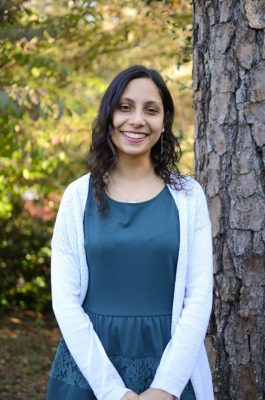Q&A with Raven Dunstan, MPH Candidate
What was your background before enrolling in the MPH program at Gillings?
Before enrolling in the MPH program at Gillings, I served as an Emergency Personnel and Operations Assistant with USAID’s Office of Food for Peace. Following this position, I worked as a Food Security Volunteer with Peace Corps in Arghakhanchi, Nepal. My background and passions within public health center on food insecurity, nutrition insecurity, and health equity.
Will you tell use more about your Graduate Research Assistant work with Dr. Aunchalee Palmquist?
As a Graduate Research Assistant, I work with Dr. Palmquist on her research at the intersection between perinatal mental health, food and nutrition insecurity, and displaced populations. I assist with drafting and editing manuscripts for publication focused on quantitative and qualitative data collected by our research team and partners to elucidate critical needs for internally displaced Yazidi persons in IDP camps in Iraq. We collaborate with the Carolina Global Breastfeeding Institute, the Global Breastfeeding Collective, and Nadia’s Initiative for our research and work.
What does “global health” mean to you?
“Global health” is a term I continue to struggle with due to its entanglements with colonial structures and white supremacy culture. For me, global health is the promotion of health equity for all persons through equitable partnerships that (1) recognize health as a human right, (2) identify persons as individuals instead of homogenizing entire populations, (3) challenge the preference for evidence-based interventions which prioritize funding over persons, (4) disrupt oppressive structures, and (5) interrupt power dynamics. Global health praxis must center decolonization, which “advances an agenda of repoliticising and rehistoricising health through a paradigm shift, a leadership shift and a knowledge shift” (Büyüm et al., 2020).
What drew you to the Gillings School of Global Public Health?
In addition to the research, expertise, and cross-sectoral collaboration within the Gillings School of Global Public Health, the culture was the determining factor for me for accepting a position within the MPH program. Speaking with Suzanne Maman, PhD, Associate Dean for Global Health, and first year students convinced me that faculty and colleagues support the success of one another. I want to see people in Gillings succeed because we’re all here for a common goal: the promotion of health equity.
What is your dream job?
My dream job would be a position that allows me to work at the intersection between nutrition and food security, health equity, developmental psychology, and innovation in equitable partnerships. For this dream job, I envision a position that would allow me to employ a multidisciplinary systems level perspective, actively work towards the decolonization of global health, and work with individuals equally passionate and excited about our work.
If you could have one superpower, what would you pick and why?
If I could have one superpower, I would want to be able to read at a super speed pace because there are so many interesting things I’d love to read but there isn’t enough time.

